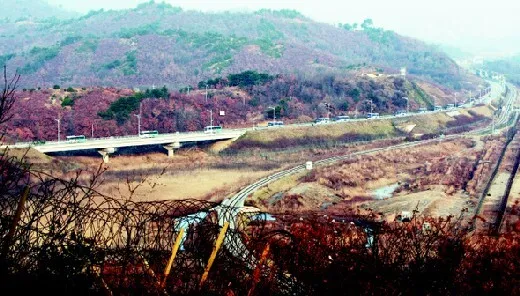hankyoreh
Links to other country sites 다른 나라 사이트 링크
[Analysis] With travel between the two Koreas restricted, what’s next for North and South?

The aftershocks of North Korea’s decision to restrict land travel between North and South continued on Tuesday, as the 501 South Koreans staying in the Gaeseong (Kaesong) Industrial Complex and the 82 at Mount Geumgang (Kumgang) who did not receive residency permits began returning to the South. It is still too early to determine whether the situation is one of ruin or whether things can be repaired. Which way the relationship turns will likely be decided by several important factors.
The six-party talksNorth and South Korea could both find they have a different amount of room in which to maneuver depending on how the six-party talks go on December 8. “The South’s government could have a better position if there is progress on the verification protocol, especially as the South has linked progress on the North Korean nuclear issue with inter-Korean relations,” said Kyungnam University Professor Lim Eul-chul. In that case, Seoul would have the justification to take decisively different action and provide the North with food and fertilizer aid.
The six-party talks could, however, end up making inter-Korean relations worse than they already are. “It will make the North that much more upset if the South makes strong demands for the inclusion of provisions for sample collection,” said an expert with a South Korean government funded research institute.
In the meantime, U.S. Assistant Secretary of State Christopher Hill is scheduled to meet with North Korean Vice Foreign Minister Kim Kye-gwan on Thursday and Friday in Singapore for bilateral talks ahead of the six-party talks in Beijing. The United States and North Korea “probably need to reach a conclusion on the verification protocol, the biggest issue between them, before the six-party talks,” said a source in Washington, D.C. “They will probably also talk about re-coordinating a schedule for economic and energy aid that is commensurate with the North’s disablement of its nuclear facility.”
North Korea’s New Year’s editorialAlso of interest is the “joint New Year’s editorial” that runs in major North Korean publications on January 1. Each new year, this “joint editorial” shows what kind of direction Pyongyang will take with policy regarding international relations and relations with Seoul. “It will give us the opportunity to see what the North’s tone will be with inter-Korean relations,” said one South Korean government official. There are mixed expectations that the North will not decide to rapidly increase the intensity of the pressure it is trying to apply on the South as it reviews its stance ahead of writing the editorial. However, the overwhelming view is that it is nevertheless unlikely that it will express a stance different from what it has been recently. Rather than announce a new direction for its approach to relations, the joint editorial will probably be an overall reiteration and reaffirmation of its current policies.
The inauguration of Barack ObamaMany are interested to see whether U.S. President-elect Barack Obama mentions anything related to the Korean Peninsula in his inaugural address. “North Korea will watch to see if there is a change in America’s approach towards enemy states and if Seoul and Washington re-coordinate their policies,” said Kim Sung-bae of the Institute for National Security Strategy. Pyongyang could easily reassess its strategies for relations with the United States and with South Korea depending on what it concludes about both of the things it is watching for. Other important milestones that could determine the course of inter-Korean relations are the U.S.-South Korean summit, coming next year, and the first anniversary of South Korean President Lee Myung-bak’s inauguration on February 25, 2009.
Based on this timetable, many observers are predicting that Pyongyang will refrain from playing its last cards, which would be the complete closing of the Gaeseong Industrial Park and breaking off of all inter-Korean relations.
“The North could, however, continue to maintain tensions to pressure the South, with things like additional restrictions such as cutting off military communications and inciting a clash along the Northern Limit Line,” Kim Sung-bae said.
Please direct questions or comments to [englishhani@hani.co.kr]
Editorial・opinion
![[Column] The end of the road for NewJeans, or a new beginning? [Column] The end of the road for NewJeans, or a new beginning?](https://flexible.img.hani.co.kr/flexible/normal/500/300/imgdb/original/2025/1022/3617611258545507.jpg) [Column] The end of the road for NewJeans, or a new beginning?
[Column] The end of the road for NewJeans, or a new beginning?![[Editorial] Korea must prepare for rough road ahead with Japan [Editorial] Korea must prepare for rough road ahead with Japan](https://flexible.img.hani.co.kr/flexible/normal/500/300/imgdb/original/2025/1022/5517611229374291.jpg) [Editorial] Korea must prepare for rough road ahead with Japan
[Editorial] Korea must prepare for rough road ahead with Japan- [Editorial] Korea cannot afford to rush to a deal with the US
- [Column] Shared dilemmas at a historic turning point for Korea, Europe
- [Column] Halfway across the world, I’m cheering on Americans fighting for democracy
- [Column] How meritocracy turns into tyranny
- [Column] The real scandal of Korea’s ‘divorce of the century’
- [Column] The meritocracy to fascism pipeline
- [Column] Korea is not an enemy to be plundered
- [Column] Chaebol can’t take credit for KOSPI’s record rally
Most viewed articles
- 1Behind far right’s success is the failure of establishment parties, says expert
- 2North Korea fires ballistic missile toward East Sea
- 3Trump’s interest in Kim Jong-un stems from real estate development hopes, says ex-US official
- 4[Editorial] Korea must prepare for rough road ahead with Japan
- 5[Column] The end of the road for NewJeans, or a new beginning?
- 6[Interview] Politics of care as an antidote to divisions caused by meritocracy
- 7New hard-right Japanese PM poses test for Lee’s vision of Seoul-Tokyo cooperation
- 8World's top tennis player faces No. 2 in exhibition event in Seoul
- 9Senior Korean officials head back to US for final coordination before summit next week
- 10Korea’s Democrats unveil plan to expand Supreme Court from 14 to 26 justices